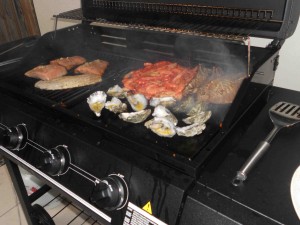Massachusetts Department of Public Health testing has shown that eight people became ill this year from eating bacteria-laden oysters, despite brand new regulations that were specifically designed to keep consumers safe.
The Cape Cod Times reports that until the DPH traced two Vibrio parahaemolyticus cases back to Cape oysters in 2011, the state had never seen that particular gastrointestinal illness caused by oysters harvested in Massachusetts waters. The  state’s colder waters and climate seemed to discourage the growth of the bacteria, which have a reproductive rate that jumps dramatically with higher water and air temperatures.
state’s colder waters and climate seemed to discourage the growth of the bacteria, which have a reproductive rate that jumps dramatically with higher water and air temperatures.
One reason for this year’s higher number of cases may be increased awareness by the public and medical professionals, leading to more testing and reporting, DPH Associate Commissioner Suzanne Condon wrote in an email to the Times. But her agency also believes warmer water and air temperatures this past summer were primary factors.
The confirmation of the two 2011 cases prompted the federal government to require the state to create a vibrio management plan. Since vibrio population numbers double every 15 minutes, the primary goal is to inhibit growth by cooling the shellfish. The plan requires that shellfishermen shade their oysters from the sun immediately upon harvesting them and either put them on ice or refrigerate them within five hours. A wholesaler has 10 hours to bring the oysters’ internal temperature down below 50 degrees and keep them at that temperature until they reach consumers.
Former Wellfleet shellfish constable Bill Walton, now an associate professor at Auburn University in Georgia, agreed that not enough data has been collected to support the climate change theory. He criticized the U.S. Food and Drug Administration, saying the agency even wants to end the sale of raw oysters. “They just seem to take a stance that these shouldn’t be sold at all,” he said. “As a consumer, I don’t want to see that. I love my raw oysters, and I don’t see why the world has changed.
“There’s always been some risk and suddenly that’s not acceptable.”
